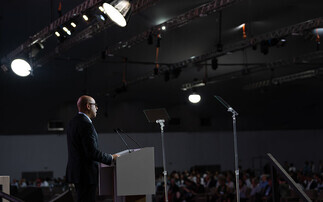On synecdoches, extremism, emissions reductions plans, and the new alliance of environmentalists
The age of Trump and Brexit is the age of synecdoche, the figure of speech where a part is made to represent the whole or vice versa.
In the UK, the 'people' suddenly refers not to the population as a whole, but the slender majority who voted to leave the EU or the almost certain minority who favour the hardest possible Brexit. 'Europe' refers not to the union of the UK's closest neighbours of which this country is still a part, but to an ominous elite of diplomats out to 'punish' the plucky Brits. Across the Atlantic, the 'people' is even more narrowly defined as those Trump die-hards who genuinely regard media reporting on the chaos and untruths emanating from the White House as 'enemy' activity.
And then there is the world of business. For Trump and his fellow travellers, 'business' refers not to the business community as a whole, but the narrow group of pollutocrats, ideologues, and Presidential golfing buddies who favour tax cuts and deregulation at every turn, regardless of wider economic and environmental impacts. 'Job-crushing regulations' covers pretty much any regulation the White House doesn't like, even those that are expected to deliver a net increase in jobs.
There is something comforting in the synecdoche. It is somehow more gratifying, for an English rugby fan at least, to hear that England beat Italy at rugby, when technically it was the English rugby team defeating the Italian rugby team. A synecdoche provides a handy short hand, bolstering a sense of community and belonging in the process.
But there are dangers in this seemingly harmless linguistic spin. The synecdoche is the enemy of pluralism, the powerful tool of the propagandist.
Apologists for President Trump and his hard right allies can declare their plans to tear up environmental regulations 'pro-business', even when large parts of the business community are vehemently opposed to them. In reality, there is no single, unified business community, just as there is no homogenous lump of people, whose single 'will' must be respected.
The other problem with the synecdoche is it is often the victim of a linguistic inertia, struggling to change with the times and finding that the conflation of the whole with a characteristic part creates a stereotype that is hard to shift long after the entity has changed beyond recognition. Nations, cities, demographic groups, and, of course, the business community, find themselves lumbered with cloying and often misleading generalisations long after the original synecdoche lost any value it once had.
All of which brings us in a circuitous manner to the CBI's hugely important intervention this week on the UK's imminent Emissions Reduction Plan.
In case you missed it, and you would be forgiven for doing so, the employers' body's new report entitled Stepping up to the Challenge, sets out the group's thoughts on how the UK should meet its ambitious goal of slashing emissions 57 per cent by 2030 against 1990 levels.
It is arguably the boldest commitment yet from many of the UK's largest businesses to the kind of deep emissions cuts required if the country is to remain competitive during a century of global decarbonisation. It also provides further evidence the Trumpian idea 'business' as a monolithic and implacable opponent of environmental progress and effective green policy-making is both outdated and misleading.
As a member organisation balancing thousands of competing interests, many of the report's recommendations are necessarily vague. There is lots of talk of 'long term frameworks' and 'whole system approaches' and 'innovation' and 'smart principles', without complete clarity on what these admirable aspirations would translate into in hard policy terms. There is also wriggle room for those members who may favour a different approach to emission reduction to that pursued by the government, with the report arguing the foundation of the new plan should be "a low-carbon transition which is affordable and keeps the lights" - there is plenty of capacity in that one sentence for those who want to see more onshore wind and solar, and those who want more gas and a slower rate of decarbonisation.
However, the CBI's overarching goal is unequivocal: full compliance with UK carbon targets in a way that builds a more resilient economy and bolsters competitiveness in new low carbon technologies and the industrial base alike. Meanwhile, there is also clear support for a host of specific green policies, including continued backing for offshore wind and tidal power, new strategies for energy efficiency, green heat, and carbon capture and storage technologies, the rapid development of a smarter grid, and a clear roadmap for the deep decarbonisation of transport.
Critics of the CBI will no doubt argue it is not above the old synecdoche trick itself, and they'd have a point. The group has long positioned itself as the 'voice of business', when in fact it is the voice of its members, many of which are drawn from the corporatist wing of the business community.
But such criticism avoids two important points. Firstly, the CBI represents 190,000 businesses employing nearly seven million people and representing about one third of the private sector-employed workforce. It may not speak for all UK firms, but it does speak for a very large chunk of them, including many of the country's largest and most successful organisations.
Secondly, the CBI's support for the low carbon economy is not an outlier. The Institute of Directors' leadership may routinely take a more hostile line towards green policies, but as we revealed last year 74 per cent of its members agree the UK "needs to decarbonise its energy use to mitigate the effects of climate change", while well over two-thirds support the increased use of renewables.
There is ample evidence the business community's stance on climate change largely mirrors that of the wider British public, which according to a poll last month from ComRes commissioned by the Energy and Climate Intelligence Unit boasts 85 per cent support for renewable energy subsidies and 65 per cent support for the phasing out of coal. Similarly, in the US clear majorities oppose Trump's supposedly 'pro-business' positions on taxes, deregulation, and climate change.
The question then is how to challenge the misconception that the people in general and the business community in particular are either agnostic or actively hostile to effective environmental policies and the emergence of a low carbon economy? How do we correct the synecdoches that stalk the political landscape, shaping everything from Trumpian climate scepticism to flawed House of Lords reports?
The CBI offers two important proposals to change the 'mind-set' of businesses and governments towards decarbonisation. It argues the low carbon transition should become a 'core thread' running through every level of government and other organisations, and calls for the the public and private sectors to work much more closely together in pursuit of a truly sustainable economy.
It is worth quoting the report at length:
"A successful low-carbon transition also requires us all to play our part, and to work together in different ways. This firstly means a new relationship for government and business, with a new and long-lasting partnership to evaluate progress and assess options. But it also requires engaging consumers: both government and business have a shared responsibility to take the public with us on the low-carbon journey. While business must build consumer confidence and excitement in low-carbon products - whether low-carbon vehicles or smart technologies in our homes - government must continue to make the public case for the low-carbon shift through an honest conversation which is clear on both the costs and benefits. Ultimately, government, business and the public must all drive and benefit from this change, creating a more competitive and prosperous Britain."
It is a valid point that contains implicit criticism of both the government and businesses, including the CBI itself. For too long and with a few notable exceptions, decarbonisation and the fundamental transformation of the economy has been engineered on the quiet. Political and business leaders have enjoyed considerable success cutting emissions and growing exciting new industries, but they have failed to consistently and loudly explain what is happening and why. Consequently, the emerging green economy is more vulnerable than it should be to the shock rise of the authoritarian, climate-sceptic right.
The CBI rightly diagnoses the problem with failing to adequately make the public case for decarbonisation, but its handling of an otherwise impressive report only underlines the scale of the challenge. The UK's largest employers' body voiced its support for an unprecedented transformation of the economy and urged Ministers to deliver it, but there was no press release, no letter to The Times, nor op ed in the FT to amplify its crucially important demands.
As a result, well-intentioned and capable politicians such as Greg Clark and Nick Hurd continue to quietly pursue ambitious decarbonisation policies knowing the primary political risk comes not from the high profile businesses who want them to be more ambitious, but from the fringe that wants to see environmental measures neutered altogether. The government needs to be bolder in setting out its green stall - you can't transform the economy on the down-low or win an argument with extremists by ducking it - but the pressure on ministers to do so rarely pushes them to make the brave choice.
One of the reasons this pressure has struggled to reach the requisite level is the outdated synecdoche that still applies to environmentalism and the failure of many environmentalists themselves to realise the movement as a whole is broader than it has ever been. The perception that all of those who care about the environment and the development of a sustainable economy look like they have just chained themselves to an oil tanker belies the fact the battalion committed to fighting climate change stretches from left to right and back again, taking in the vast majority of the public and vast swathes of the business community.
Inevitably, members of this group can and must continue to disagree vehemently on precisely how the transition to a sustainable economy will be managed. On many of the narrow policy issues and competing technological approaches green campaigners, big business, and politicians of different tribes will continue to disagree fundamentally, and so they should.
But on the fundamentals of what the CBI is calling for there is widespread agreement and genuine excitement from thousands of businesses, social democrats and conservatives, green campaigners and city investors. There is a unity of purpose here, even if tribal divisions remains a spiky as ever, as evidenced by conservative philosopher Roger Scruton's assertion this week that "the true environmentalist is also a conservative".
There should be a crescendo of disparate voices finding common cause and demanding that on this occasion the business lobbyists are given precisely what they want - and yet this report is at risk of passing off with barely a whimper and a fraction of the column inches generated by a deeply flawed House of Lords report criticising renewable energy. Businesses need to find the confidence to publicly stand up for the progressive vision they clearly hold, and campaigners and politicians need to find the wisdom to recognise that on this issue they have a powerful ally.
I appreciate this all sounds naively optimistic given the justified criticism many corporations continue to merit over their dubious environmental records and propensity for greenwash. Too many CBI members will continue to sign off on the group's ambitious decarbonisation agenda while still privately lobbying against the policies needed to make it a reality. But sometimes it pays to take an organisation's public commitments at face value and recognise that there is plenty of grounds for common cause between corporate, civil, and political society.
I've been reading the journalist Nick Cohen's vibrant and prescient polemic What's Left recently, and thinking a lot about its fundamental lesson of how in any democracy it pays to a) keep a close eye on extremist positions because they can quickly enter the mainstream, and b) recognise that when push comes to shove you have to pick a side and be prepared to defend its fundamental values.
For environmentalists, these lessons seem particularly pertinent as Trump commences his war on planetary boundaries and his British fan-boys prepare to exploit Brexit to follow him into the breach. The under-exploited alliances and shared interests between different camps of climate activists, from Greenpeace to the CBI, need to be built in recognition that the primary threat to society, the economy, and the environment comes not from each other, but from the extremes. It is time to pick a side and bury the stereotype that paints business as inherently callous despoilers of the planet, just as it is vital to challenge the idea that all environmentalists are naïve communists.
As the threat from the hard right to global stability and the long term health of the planet becomes ever more overt, these lazy synecdoches need to be updated for a redefined corporate and public mainstream that demands action on climate change and prioritises sustainable development. To borrow a phrase, it is time all environmentalists, including corporate giants, professional politicians, and dyed in the wool eco-warriors, recognised that far more unites us than divides us.









